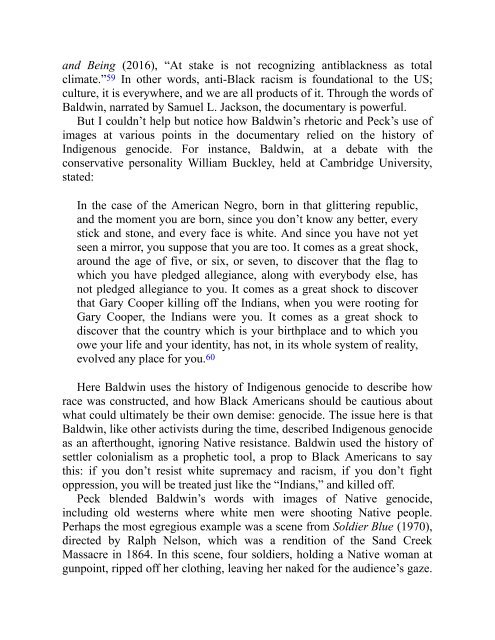Create successful ePaper yourself
Turn your PDF publications into a flip-book with our unique Google optimized e-Paper software.
and Being (2016), “At stake is not recognizing antiblackness as total<br />
climate.” 59 In o<strong>the</strong>r words, anti-Black racism is foundational to <strong>the</strong> US;<br />
culture, it is everywhere, and we are all products <strong>of</strong> it. Through <strong>the</strong> words <strong>of</strong><br />
Baldwin, narrated by Samuel L. Jackson, <strong>the</strong> documentary is powerful.<br />
But I couldn’t help but notice how Baldwin’s rhetoric and Peck’s use <strong>of</strong><br />
images at various points in <strong>the</strong> documentary relied on <strong>the</strong> history <strong>of</strong><br />
<strong>Indigenous</strong> genocide. For instance, Baldwin, at a debate with <strong>the</strong><br />
conservative personality William Buckley, held at Cambridge University,<br />
stated:<br />
In <strong>the</strong> case <strong>of</strong> <strong>the</strong> American Negro, born in that glittering republic,<br />
and <strong>the</strong> moment you are born, since you don’t know any better, every<br />
stick and stone, and every face is white. <strong>An</strong>d since you have not yet<br />
seen a mirror, you suppose that you are too. It comes as a great shock,<br />
around <strong>the</strong> age <strong>of</strong> five, or six, or seven, to discover that <strong>the</strong> flag to<br />
which you have pledged allegiance, along with everybody else, has<br />
not pledged allegiance to you. It comes as a great shock to discover<br />
that Gary Cooper killing <strong>of</strong>f <strong>the</strong> Indians, when you were rooting for<br />
Gary Cooper, <strong>the</strong> Indians were you. It comes as a great shock to<br />
discover that <strong>the</strong> country which is your birthplace and to which you<br />
owe your life and your identity, has not, in its whole system <strong>of</strong> reality,<br />
evolved any place for you. 60<br />
Here Baldwin uses <strong>the</strong> history <strong>of</strong> <strong>Indigenous</strong> genocide to describe how<br />
race was constructed, and how Black Americans should be cautious about<br />
what could ultimately be <strong>the</strong>ir own demise: genocide. The issue here is that<br />
Baldwin, like o<strong>the</strong>r activists during <strong>the</strong> time, described <strong>Indigenous</strong> genocide<br />
as an afterthought, ignoring Native resistance. Baldwin used <strong>the</strong> history <strong>of</strong><br />
settler colonialism as a prophetic tool, a prop to Black Americans to say<br />
this: if you don’t resist white supremacy and racism, if you don’t fight<br />
oppression, you will be treated just like <strong>the</strong> “Indians,” and killed <strong>of</strong>f.<br />
Peck blended Baldwin’s words with images <strong>of</strong> Native genocide,<br />
including old westerns where white men were shooting Native people.<br />
Perhaps <strong>the</strong> most egregious example was a scene from Soldier Blue (1970),<br />
directed by Ralph Nelson, which was a rendition <strong>of</strong> <strong>the</strong> Sand Creek<br />
Massacre in 1864. In this scene, four soldiers, holding a Native woman at<br />
gunpoint, ripped <strong>of</strong>f her clothing, leaving her naked for <strong>the</strong> audience’s gaze.


















